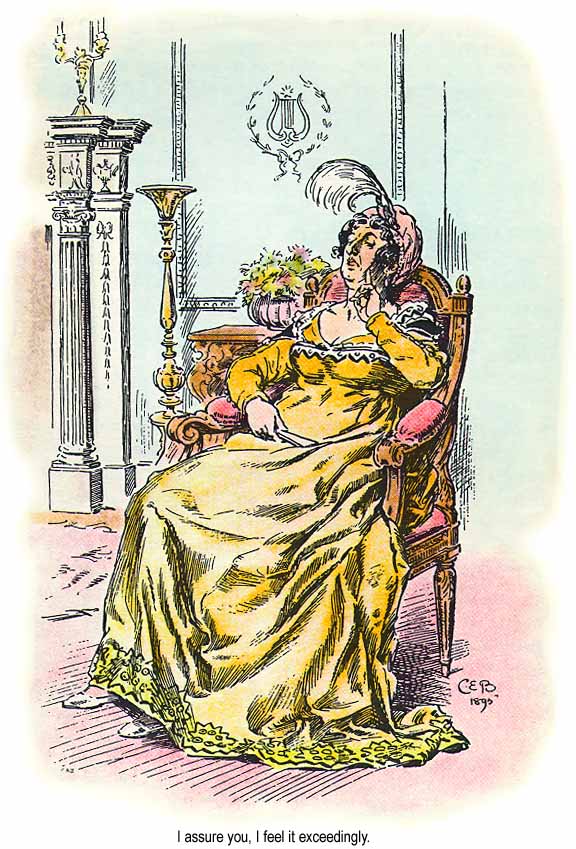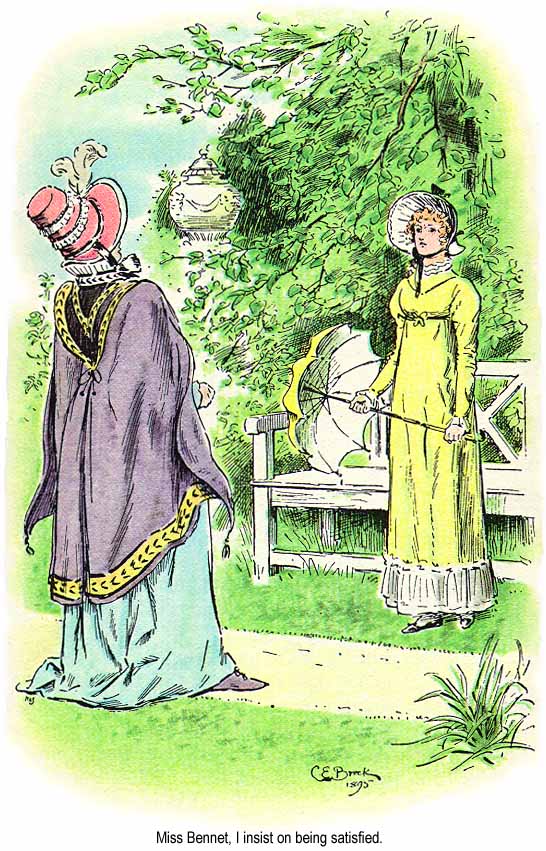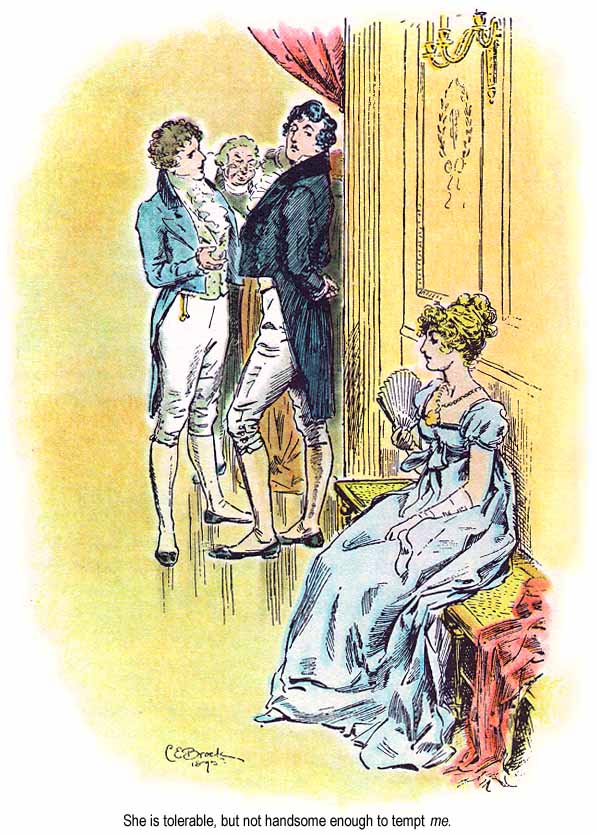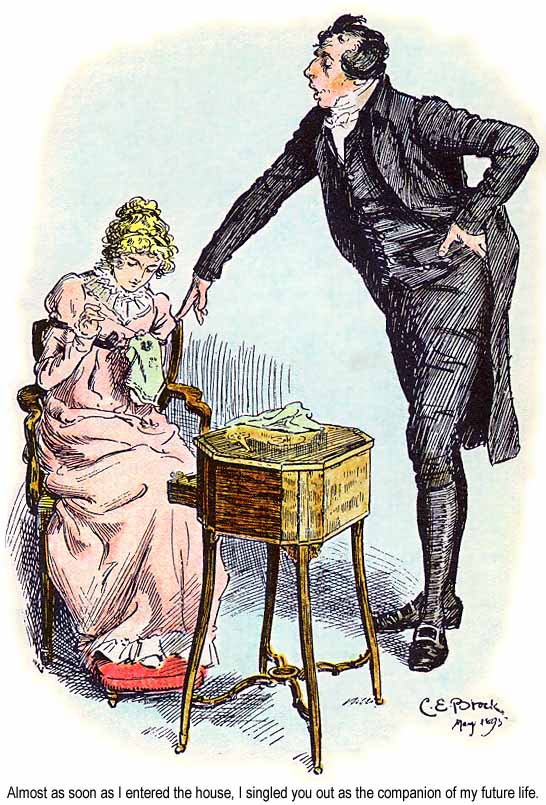She’s famous for being the Prejudiced one in Pride & Prejudice, but—her misjudgement of Darcy and Wickham aside—there’s a lot of sturdy common sense in Lizzy Bennet’s approach to life which we can all make use of. Here are ten principles which she follows.
I: Don’t Need Everyone’s Approval
Not everyone you encounter in this world will like you, for reasons which may or may not have anything to do with you. Don’t let your peace of mind depend on the approval of others.
During her stay at Netherfield, Lizzy gets the distinct impression that Mr Darcy dislikes her. “The supposition did not pain her. She liked him too little to care for his approbation.”
II: Don’t Get Into An Argument Before You Must
As the old saying goes, don’t meet trouble halfway. Mrs Bennet drops some pretty heavy hints to Elizabeth about the desirability of her marrying Mr Collins, but “Elizabeth however did not choose to take the hint, being well aware that a serious dispute must be the consequence of any reply. Mr Collins might never make the offer, and till he did, it was useless to quarrel about him.”
III: Don’t Argue With Someone Who Isn’t Listening
It’s a waste of your time. Keep your breath to cool your porridge, swell your song, or any of the myriad other uses to which breath can be put.
While Mr Collins is listening to Elizabeth’s refusal in the sense that he hears the words she says, he refuses to take anything Elizabeth says seriously. “To such perseverance in wilful self-deception Elizabeth would make no reply, and immediately and in silence withdrew.”
IV: Don’t Resent Proffered Advice
Getting upset achieves nothing. Listen to the advice, consider it, and accept it if good, or dismiss it if bad.
When Aunt Gardiner advises Lizzy not to get too attached to the equally impecunious Mr Wickham, she considers the advice—and the situation—and finally says “upon my honour, I will try to do what I think to be wisest; and now, I hope you are satisfied.”
V: Don’t Be Intimidated Just Because Others Are
Look at the facts. Is timidity or trepidation or anything else really justified?
“When they ascended the steps to the hall, Maria’s alarm was every moment increasing, and even Sir William did not look perfectly calm. Elizabeth’s courage did not fail her. She had heard nothing of Lady Catherine that spoke her awful from any extraordinary talents or miraculous virtue, and the mere stateliness of money and rank, she thought she could witness without trepidation.”

VI: Don’t Agree Just Because It’s Expected Of You
Just because someone expects something of you, doesn’t mean you are obliged to comply. But that doesn’t mean that you need to be rude about it, either.
Elizabeth politely disagrees with Mr Collins’ expectation that she will want to marry him, Lady Catherine’s dictums on raising daughters, and Mr Darcy’s expectation that she will want to marry him. (All right, mostly politely in the latter case. And even he admits he had it coming: “What did you say of me, that I did not deserve?”) And then she also politely disagrees with Lady Catherine’s demand that she promise never to accept him.
VII: Don’t Hold To An Opinion Just Because It’s Yours
Unless you wish never to learn anything ever again, you must be open to reconsidering your opinions. Don’t be prejudiced; consider the facts.
After reading that devastating letter from Mr Darcy, Lizzy “put down the letter, weighed every circumstance with what she meant to be impartiality—deliberated on the probability of each statement—but with little success. On both sides it was only assertion. Again she read on…..giving way to every variety of thought; re-considering events, determining probabilities, and reconciling herself as well as she could, to a change so sudden and so important.”
If she hadn’t, there would be no happy ending, and the second half of Pride & Prejudice might qualify it to be categorized as a tragedy, rather than a comedy.
VIII: Don’t Dwell On The Negative
Lizzy doesn’t, even when her father dismisses her wise advice. “It was not in her nature, however, to increase her vexations, by dwelling on them. She was confident of having performed her duty, and to fret over unavoidable evils, or augment them by anxiety, was no part of her disposition.”
And while she can and does reconsider the past in order to improve her understanding in the present, she tells Mr Darcy, “You must learn some of my philosophy. Think only of the past as its remembrance gives you pleasure.”
IX: Don’t Linger When Tempted
If you find yourself in a situation where you are tempted to do something against your principles, or something you already know you will regret, don’t hang around waiting to see what happens.
Lydia says she’ll break her promise of silence if anyone asks her about Mr Darcy’s presence at her wedding—a matter of burning curiosity—so “on such encouragement to ask, Elizabeth was forced to put it out of her power, by running away.”
X: Don’t Let Others Make Their Problems Your Problems
This is most exquisitely illustrated in the Pretty Little Wilderness Showdown.
“You are to understand, Miss Bennet, that I came here with the determined resolution of carrying my purpose; nor will I be dissuaded from it. I have not been used to submit to any person’s whims. I have not been in the habit of brooking disappointment.”
“That will make your ladyship’s situation at present more pitiable; but it will have no effect on me.“

Can you think of other useful maxims from the example of Elizabeth Bennet? Share them in the comments!



